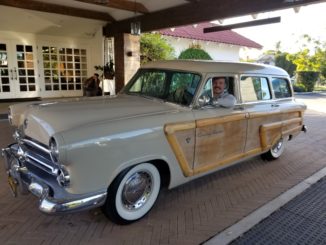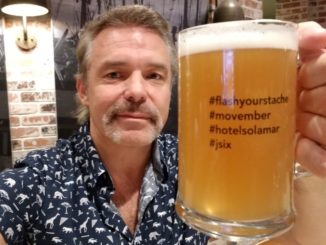

(Brian Bogle is a prostrate cancer survivor. This Q&A originally apeared in November 2018, and is being re-run in honor of Movember 2019. Note: Bogle, who last year was named as the top salesperson at his company, reports he is also still doing great healthwise.)
Nearly everyone who knows Brian Bogle calls him…Bogle. Even his wife, Diane, who shares his surname, calls him Bogle. He is a broad-shouldered, kind-hearted husband and father. The 58-year-old Bay Park resident is passionate about working on cars, including a 1966 two-door Fury. He plays golf and poker, and enjoys drinking beer. He’s also a prostate cancer survivor.
In 2018, like one of nine men in the United States, Bogle was diagnosed with prostate cancer.
He’s an old and dear friend of my wife, and was the officiant at our wedding. He’s also graciously supported my mustache-driven Movember events every November. Movember is the time for the spotlight to shine on men’s health issues, so I asked Bogle if he would share his personal experience on JunketsAndJaunts.com.
“I’m not afraid to discuss this,” he says. “If I can help anybody with what I’ve learned, I will. I’ll say: ‘Here’s what they’re gonna tell ya, here’s what they’re gonna do, and here’s the negative experience. But also, here’s the upside—here’s the light at the end of the tunnel.’”
We sat down for straight talk and tacos at Curadero, inside Kimpton Hotel Palomar San Diego.
Q&A with a Prostate Cancer Survivor
Junkets&Jaunts: What was your attitude about health care all your life?
Brian Bogle: I grew up hearing stories of men who didn’t take care of their health, or who put things off. My uncle died suddenly because he put off taking care of his health. We can all learn from the lesson from others.
J&J: Do you do annual check-ups?
Bogle: My company pays for a full health screening/checkup every other year. Sometimes I had them once every three years.

J&J: How and when did you discover you had prostate cancer?
Bogle: I went to doctor at the end of 2017. I did a blood test for PSA [Prostate-Specific Antigen]. Over the years, it was on a roller-coaster—from 10 to 8 and then up to 13. Higher numbers are bad. My doctor recommended me to a urologist and that doctor recommended a biopsy.
That’s when things progressed. I had told the urologist to leave me a voice mail with the results. There was no pain or anything–I felt good. But, I got the voice mail while driving my car in downtown San Diego: “We did check the biopsy and there was some cancer, so call us back.” That was unsettling. I called back. Of 12 biopsies, nine were bad and two were really bad.
J&J: Then what?
Bogle: They scheduled a bone scan. Then an MRI. They also did a radiation scan—that was to see if it had spread from the prostate. Fortunately for me it was just in the prostate.
J&J: What’s going through your mind at this point?
Bogle: Well, they said they were recommending surgery to remove the whole prostate…They said here’s what will happen: You will not be able to produce semen anymore; you’re not going to get anybody pregnant. It will be difficult to get an erection unless we can save a lot of the nerves that are attached to your urethra that come off the prostate.
The time from getting the call in the car to being on the operating table was about two and a half weeks.

J&J: What was the recovery period like?
Bogle: The surgery was on March 10. About six months later, I was essentially back to normal.
That was the long run. Along the way there are challenges, though. You have to have a catheter in place of your prostate for one to two weeks. I said one week, please.
They want you off work for four weeks. I took off two—mainly because it helped keep my mind off of it and it was therapeutic to go back to work.
J&J: What are the physical challenges?
Bogle: Your prostate is what gives you bladder control after you’ve had 10 beers. That control goes away. But you do have a secondary control—the sphincter muscle. You have to learn to develop strength there. I went to a physical therapist for it, and it was very helpful.
That first day after surgery, I could barely make it across the room without something escaping. You start out using heavy pads to block it. Then, you switch to thinner ones. Now, I don’t use them, but it was kinda like a kid learning to get off the diaper, again.
Getting erections is the hardest part. I started with Viagra, and it worked, but it gave me horrible headaches. Cialis gave me leg pains. I tried a third drug that worked well, but the leg pain started coming back.
J&J: How are you managing your health now?
Bogle: I’ll continue to get check-ups. I want to take care of myself for Diane and my daughter, Sydney.
J&J: What recommendations would you make to other men?
Bogle: Don’t ignore your health. Do your own research. Don’t be afraid to ask questions. This could have ended up a lot worse. I was in Vegas recently, telling a friend this story. His eyes got really wide and he said, “Oh, my God, I haven’t been to the doctor in years.” I told him if you don’t go, if and when you do find something the race against the clock just gets worse.

J&J: Has this experience changed you?
Bogle: I just feel very fortunate. The hardest person to tell was Sydney. On my birthday, I like to give rather that get something. This year, I wrote a letter to Diane and Sydney. I thanked them for being so supportive. I’m lucky, and very happy with the way things turned out.
J&J: Thanks so much for speaking so frankly about being a prostate cancer survivor. Any final thoughts?
Bogle: In an odd way, this has become a motivating factor. I’m having my best year in sales ever. I work at Waxie Sanitary Supply—I’m your local toilet paper salesman. Been there since 1990. I’ve been salesman of the year three times and am on pace for it this year.
Recently, I recently told a group of people at work about this. I said: “I don’t like to keep secrets. I have two families. There’s my Waxie family, and here’s what my family at home knows—I had prostate cancer surgery, and I’m doing good.”
That was in October. I told them: “October is known as women’s health month and November/Movember is for men’s health. But all cancer should be addressed, and for your own sake and for your family’s sake, get yourself checked out.” J&J




2 Trackbacks / Pingbacks
Comments are closed.